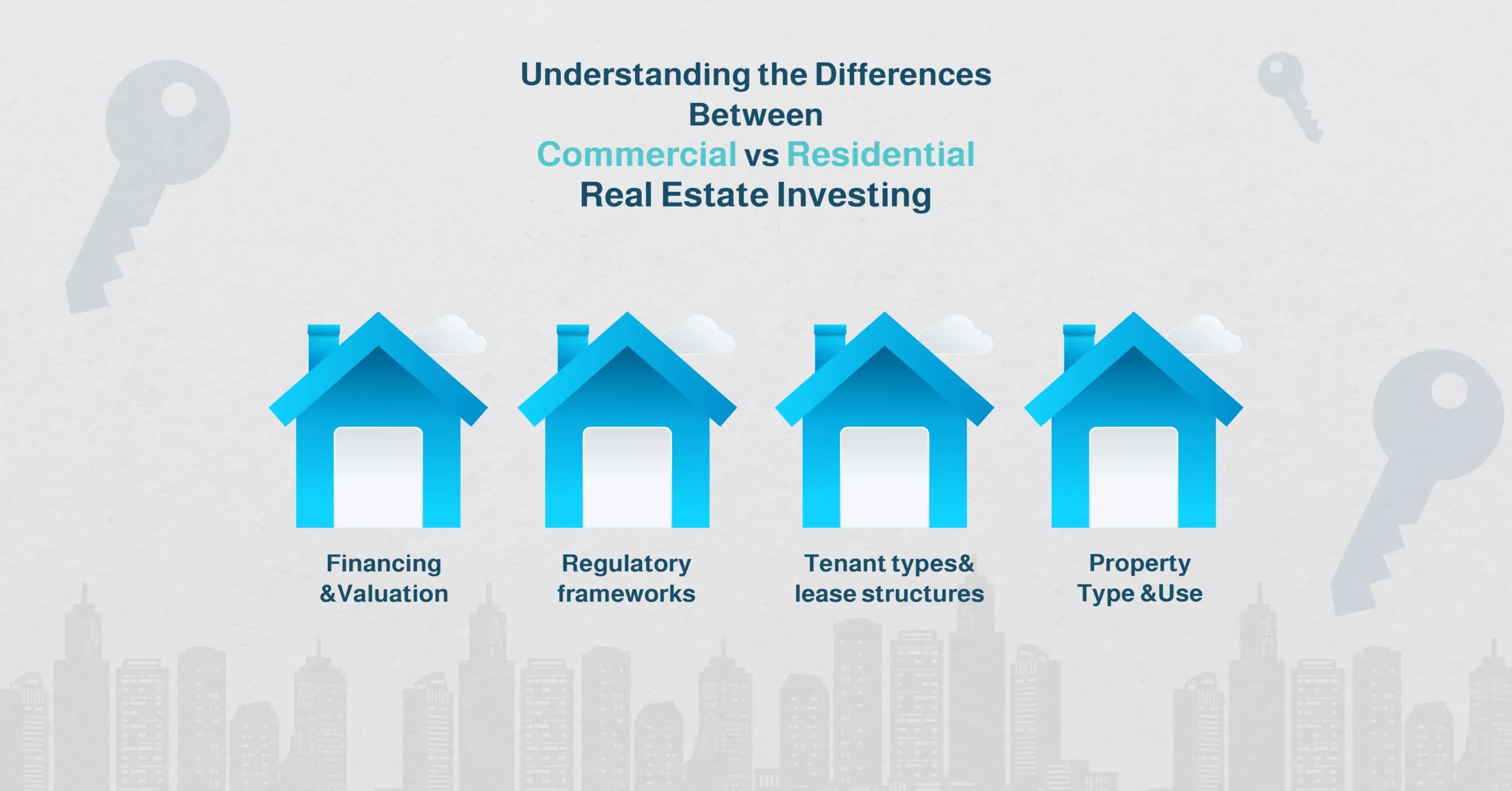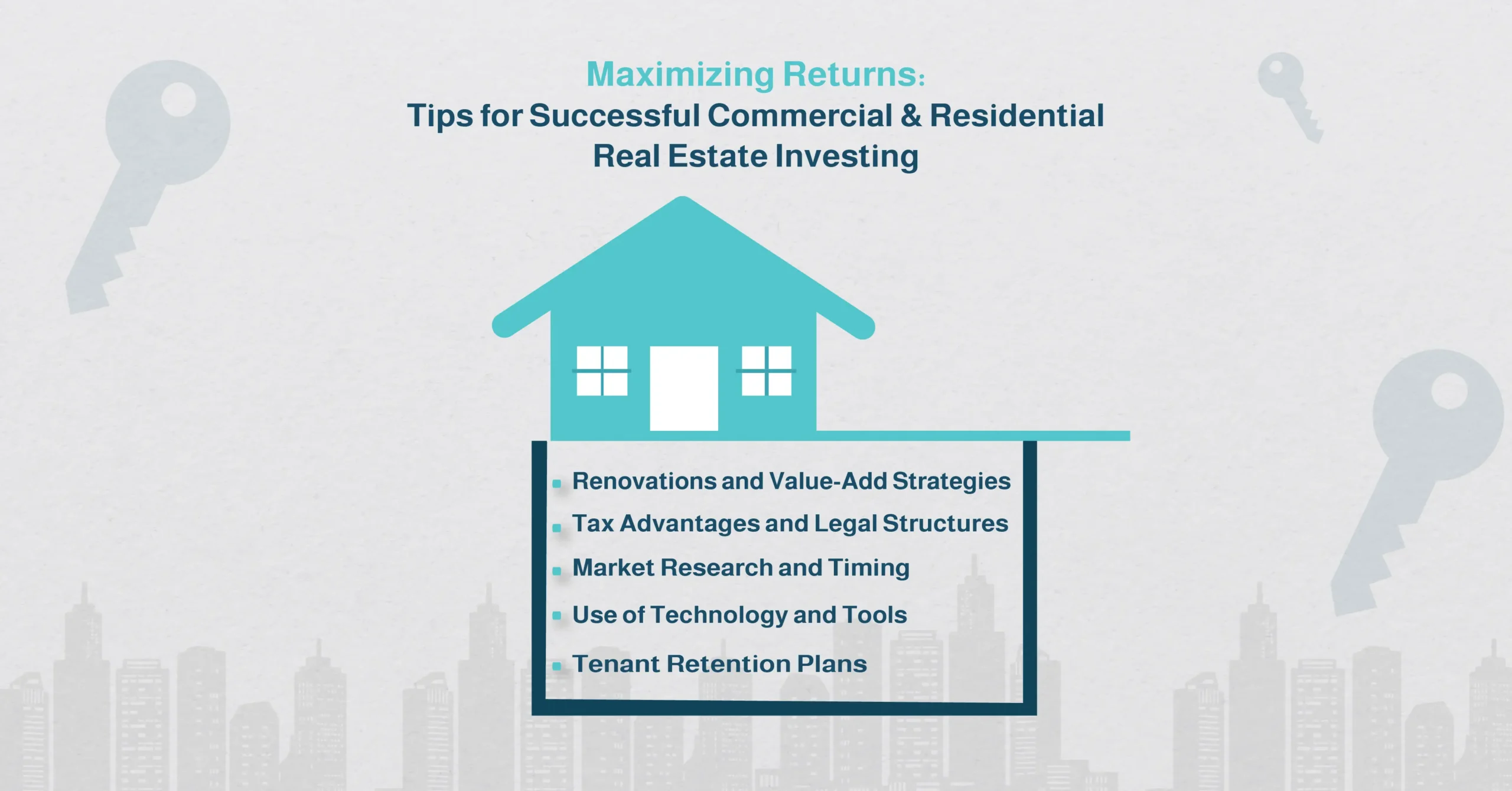Growing up, we are often taught that the first thing we do when we begin working is buy a property, as it is a good investment. Real estate investment has long been the linchpin of investment and wealth building. It provides the investor with income, capital appreciation, and diversification of their portfolios. This rings true as much today as it did all those years ago; real estate investment is still a good idea. The pertinent question becomes whether we invest in commercial real estate or residential real estate.
You can start investing now from the Gamma Asset Investment Platform
Understanding the Differences Between Commercial vs Residential Real Estate Investing

As investors, we must have an understanding of the core differences between commercial vs real estate investing. Each is vastly different from the other concerning financing mechanisms, regulations, property type, lease structures, and tenant profiles.
- Property Type and Use
- Commercial: Property is intended to be used by businesses and includes Office spaces, Retail properties, Industrial facilities (warehouses), Multifamily complexes, and special-purpose properties, which include hospitals, hotels, etc
- Residential: Houses and flats to be inhabited by families or individuals.
- Tenant types and lease structures
- Commercial: Longer period leases, 5 to 10 years, with businesses, the lease may include clauses in which the tenant covers property expenses.
- Residential: Shorter lease periods, a year on average, and property expenses fall on the property owner.
- Regulatory frameworks
- Commercial properties are subject to safety regulations, building codes, and even zoning laws.
- Residential: Laws focusing on the habitability of the property and tenant rights are known as landlord-tenant laws.
- Financing and Valuation
- Commercial: Potential income is considered when a commercial property is valued. Purchasing requires a higher down payment and higher interest rates.
- Residential: Valuation is determined by properties in the area that are comparable. Residential is a more accessible option for the new investor, as financing will include a lower down payment.
Pros and Cons of Commercial vs Residential Real Estate Investing

Pros of Commercial Real Estate Investing
- Higher Cash flow Potential from commercial properties due to a higher income stream. Will commonly have multiple tenants with longer-term leases. Lease clauses may be included to reduce the risk of property expenses for the owner.
- Tenant stability. Commercial property leases tend to be long-term, spanning 5 to 10 years, meaning a stable income stream. Businesses can adapt spaces to suit their needs and maintain that space, which will further reduce turnover as the space is now suited to their needs.
- Triple Net Leases Reduce Landlord Responsibility. NNN (Triple net) leases are designed to place the financial responsibility on the tenant for property taxes, insurance, and even maintenance costs.
- The potential for forced appreciation. Property values can be increased by investors through increasing rental income or improving property efficiency. The value of a commercial property is determined by its potential income.
Pros of Residential Real Estate Investing
- Lower entry cost and accessibility. An ideal choice for new or individual investors, as residential property requires less capital to purchase.
- Consistent demand and easier financing. With the current housing crisis, there is a constant demand for residential property, meaning a stable rental market and a low-risk investment. Lower interest rates and down payments make residential property financing favourable for investors.
- Simple property management. Fewer regulations and maintenance issues make dealing with single-family homes more manageable for a landlord.
Cons of Commercial Real Estate Investing
- Higher entry costs. Commercial property can be more challenging for new investors as it requires a larger initial capital outlay.
- Complex property management. Zoning laws, specialized property maintenance, and the diverse needs of tenants are all challenges for an investor.
- Sensitive to economic cycles. Rental income may be affected by recessions and economic fluctuations. Businesses may be affected, which may lead to an increase in vacancies.
Cons of Residential Real Estate Investing
- Higher Tenant Turnover and Shorter Lease Terms. The leases in residential properties tend to be shorter. Increased vacancy periods mean additional costs for the investor.
- Lower Rental Income. The return on investment may be impacted by the lower rental income rate offered by residential real estate.
- Greater Landlord Responsibilities. Operational costs and personal involvement are often higher with residential properties as it is the owner or landlords responsibilty for maintenance and repairs.
Key Factors to Consider When Choosing Between Commercial and Residential Real Estate Investments
Before forging ahead with your investment, it is important to consider the level of involvement and responsibilities between commercial vs residential real estate investing.
Firstly, your investment goals need to be considered. Commercial property income will be higher as the leases are longer and the property is usually rented to multiple businesses. Due to the high housing demand, residential properties may see a steady appreciation over time. Commercial and Residential properties both offer the investor tax advantages, but they differ from each other in structure. How involved would you like to be in the management of the property? Does it work for your lifestyle?
Next, we need to consider the property’s location and the market trends. Commercial properties are most profitable if they are close to business hubs and areas of current economic expansion. For residential properties, it is important to factor in accessibility to schools and amenities, the safety of the neighborhood, and convenience.
Financing and affordability, as we have discussed, commercial properties require a larger capital outlay with higher interest rates, whereas residential properties have better loan terms and lower interest rates.
How much time are you willing to commit, and what is your management style? Residential management is fairly straightforward for single-family homes, but commercial properties are a whole other kettle of fish, as they require complex management and experience.
Finally, when looking at the key factors to consider, we must consider experience and comfort level. Knowledge of commercial leases and property use would be advantageous when dealing with businesses. Managing individual tenants might be more manageable for a new investor as it lacks the complexity of commercial property.
If you are unsure where or how to align your investment strategy with your goals, Gamma Assests offer tailored real estate investment solutions and stragic insights for both first-timer and seasoned investors.
Risk Management Strategies for Commercial and Residential Real Estate Investors
While risk is a very real part of real estate investing, using start strategies will help mitigate long-term losses in commercial vs residential real estate investment.
Risks
Let’s take a look at some of the common risks associated with commercial real estate investing. Market volatility, property value can be impacted by economic downturns and recessions. Tenant turnover can lead to longer periods of vacancy, affecting income. Regulatory compliance, commercial properties are subject to strict building codes and zoning laws.
As for the risks associated with residential real estate, investors need to consider tenant issues, such as damage to property or defaulting on payment impacting income. Market fluctuations, any downturns may cause property values to decrease, Lastly, it is up to the investor to maintain the property, leading to ongoing costs that can eat into profit margins.
Risk strategies
Risk strategies are vital for all real estate investors.
- Diversification across multiple property types or geographic locations can attenuate the risk associated with economic downturns.
- A Reserve of emergency funds should they incur unexpected costs associated with the investment property.
- “Get it in writing,” legal protection and lease agreements are meant to act as a method of protection for the investor.
- Hiring a professional property manager ensures your property retains its value and remains operational.
It is important that investors proactively manage their investments to ensure the risk associated with commercial and residential real estate investing is minimized, protecting your capital.
Maximizing Returns: Tips for Successful Commercial and Residential Real Estate Investing

To maximize your returns investors must have a comprehensive understanding. Taking the time to educate yourself on commercial vs. residential real estate investing is vastly important, understanding that success comes from optimization.
- Renovations and Value-Add Strategies.
We know that bathrooms and kitchens sell houses; the same can be said for increasing rental value. Updating your investment property can boost rental income by appealing to a higher-paying tenant.
- Tenant Retention Plans.
A lack of tenants will mean a lack of income. Residential properties that include amenities and prompt maintenance services increase tenant satisfaction. Commercial properties aim for longer leases, ensuring a steady income. Proactive management of leases and accommodating the needs of current tenants can help and prevent vacancy.
- Market Research and Timing
Returns can be maximized through thorough research of the area. Investors should aim to invest in high-demand areas and have a good understanding of economic indicators such as demographic trend and demand. Ensure due diligence to ensure that there a no hidden costs or unexpected risks.
- Tax Advantages and Legal Structures
There are various methods to ensure your investment is as profitable as it can be. To offer liability protections and tax advantages LLCs may be utilized. Making use of tax benefits or strategies such as cost segregation to reduce taxable income has proven advantageous to the investor in numerous cases.
- Use of Technology and Tools
Property management software can save investors time by simplifying operations. Managing rental income, maintenance schedules even help with data analysis. This would be a huge benefit for investors, allowing them to make informed decisions.
- Networking and Mentorship
“It’s not what you know, it’s who you know.” Networking events, partnering with someone more experienced, or engaging in real estate communities can enhance an investor’s knowledge and lead to beneficial partnerships in the future.
More topics can be read on the Gamma blog
Frequently Asked Questions: Commercial vs Residential Real Estate Investing FAQs
- What is more profitable, commercial or residential?
Commercial real estate often generates a higher income but requires greater industry knowledge and has more risk associated, perfect for the investor seeking higher returns. Residential property is perfect for the new investor due to the lower cost and simplicity.
- Which type of property is best for investment?
This is completely determined by goals, experience and access to capital. For the new investor residential investment may be better suited as a starting investment on which they can build wealth. Commercial property is better suited to an investor with more experience.
- Is it worth it to invest in commercial real estate?
Yes, investing in commercial real estate is a great investment if you are able to manage the upfront cost involved and the complex leases. In commercial vs residential real estate investing, commercial is the goal for many due to the higher income.
- Which is better: commercial property or residential property?
There is no right answer, each has its benefits and pitfalls. The better question would be which is right me me as an investor, commercial vs residential real estate investing.
The decision between commercial vs residential real estate investing should not be taken lightly. A careful consideration of personal goals, risk tolerance, and lifestyle needs to be taken into account. It is essential to understand the differences between commercial vs residential real estate investing, and understand that each comes with pros and cons. Ensure you practice smart risk management and choose a path that is best suited to you and your portfolio, both short and long term.













